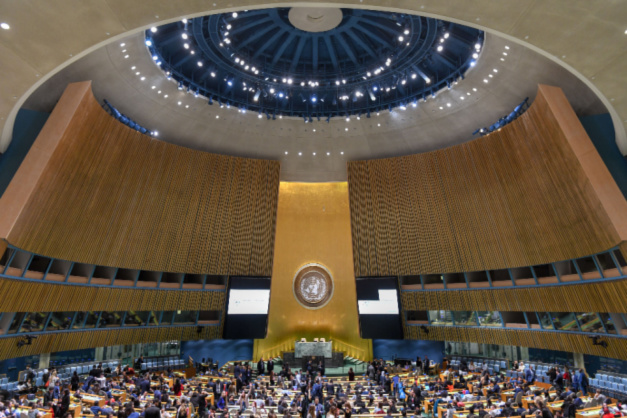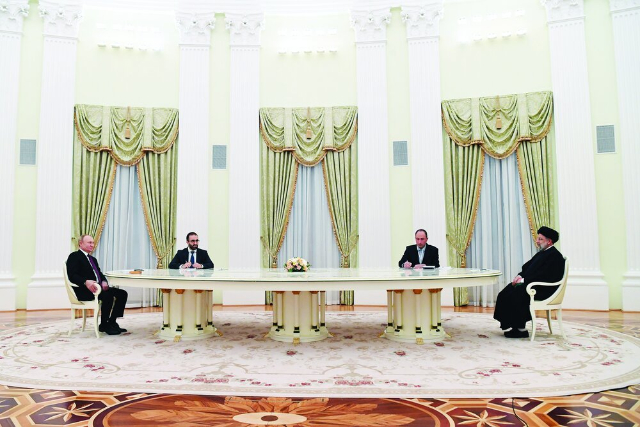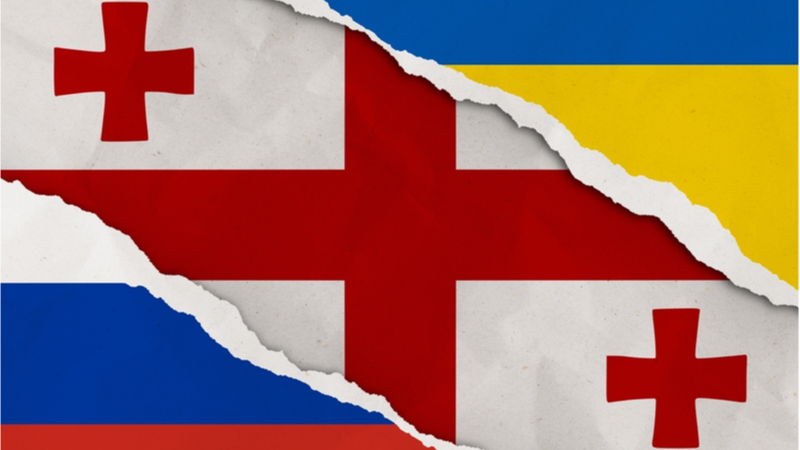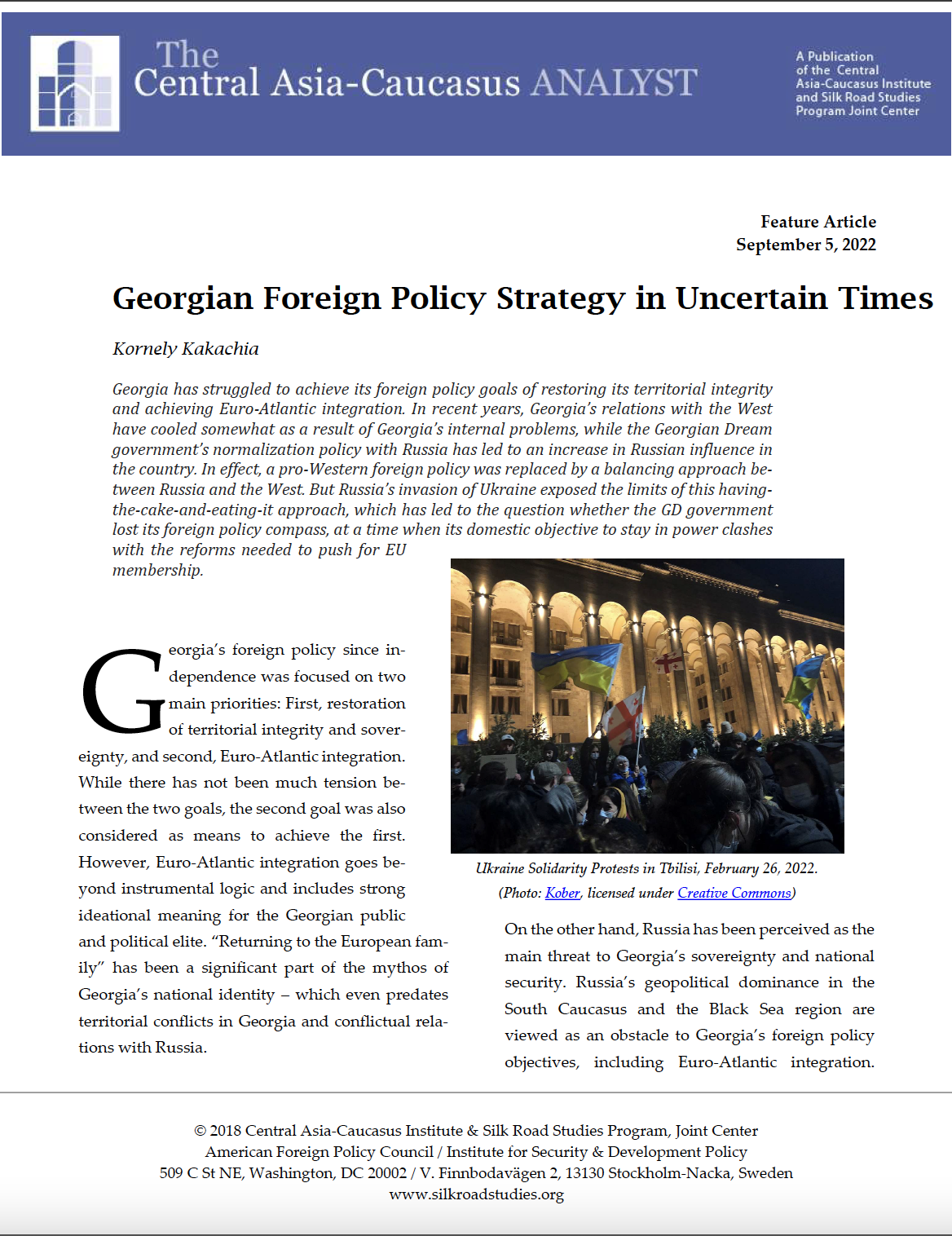President Mirziyoyev’s Strategic Urgency
By S. Frederick Starr
September 6, 2022
Speaking on Uzbekistan’s independence day, President Shavkat Mirziyoyev addressed a somber memorial ceremony dedicated to the “victims of political repression” during the Soviet era. He focused on the Uzbek reformers known as Jadids that were killed or suppressed in the early Soviet period. He also addressed at length Moscow’s singling out of Uzbekistan during the “cotton crisis” of the 1980s. This speech was remarkable because it effectively shifted the blame for Uzbekistan’s historical woes from Stalin or Communism to Russian imperialism. The same day, Mirziyoyev pledged to expand the power of the country’s armed forces, indicating the seriousness with which Uzbekistan’s leaders view developments in recent months, chief among them Russia’s invasion of Ukraine.

Georgian Foreign Policy Strategy in Uncertain Times
By Kornely Kakachia
September 5, 2022
Georgia has struggled to achieve its foreign policy goals of restoring its territorial integrity and achieving Euro-Atlantic integration. In recent years, Georgia’s relations with the West have cooled somewhat as a result of Georgia’s internal problems, while the Georgian Dream government’s normalization policy with Russia has led to an increase in Russian influence in the country. In effect, a pro-Western foreign policy was replaced by a balancing approach between Russia and the West. But Russia’s invasion of Ukraine exposed the limits of this having the-cake-and-eating-it approach, which has led to the question whether the GD government lost its foreign policy compass, at a time when its domestic objective to stay in power clashes with the reforms needed to push for EU membership.
Uzbekistan Between Ukraine and Russia: The Curse of Positioning
By Farkhod Tolipov
May 31, 2022
Russia’s war in Ukraine has become an existential geopolitical challenge for all former Soviet republics. Uzbekistan’s formulation and expression of a position on the war has been difficult in an ethical and political sense. Positioning on this matter is also a serious test for the strategic partnership and unity of Central Asian states. At the UNGA, Uzbekistan did not vote on the resolution blaming Russia for aggression against Ukraine. However, it voted against the exclusion of Russia from the UN Human Rights Committee. Uzbekistan’s MFA later brought some clarity to Tashkent’s position, which could potentially irritate Moscow. The curse of positioning reflects the enduring and perplexing geopolitical status-quo in Central Asia.

Iran and the Ukraine Crisis: Complexities and Considerations
By Vali Kaleji
April 25, 2022
Iran’s close relations with the Russian Federation, along with Tehran’s efforts to maintain relations with Ukraine, have complicated Iran’s approach to Russia’s military invasion of Ukraine. Although Iran has not recognized the independence of the so-called Donetsk and Luhansk People’s Republics, it simultaneously has not criticized the attack and abstained from voting on a UN General Assembly resolution condemning Russia’s invasion of Ukraine. While Tehran, like Russia, opposes NATO enlargement, it is concerned over possible negative implications of the war for the talks on Iran’s nuclear program.

National Interest and Regime Survival: Why Georgia is Cautious Towards the Russia-Ukraine War
By David Aprasidze and Giorgi Gvalia
April 22, 2022
Georgia experienced invasion by Russia in 2008 and is since partially occupied. It shares Euro-Atlantic aspirations with Ukraine. This context suggests that Georgia should be more straightforward and bolder in condemning the Kremlin’s aggression against Ukraine. However, Georgia has taken a cautious stance: it did not join any of the West’s sanctions against Moscow. Georgia’s appeasing posture seems conditioned not only by the security threats posed by Russia but also by Georgia’s domestic politics. The Georgian government is attempting a difficult balance between two types of threats – on the one hand to its national survival and on the other to the survival of its regime.







